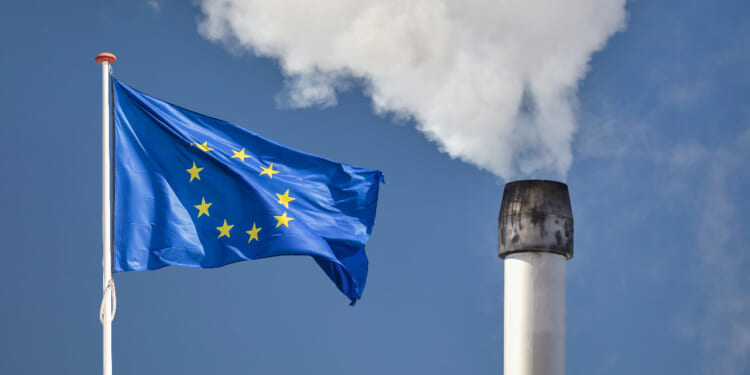The need to lower greenhouse gas emissions across the European industrial and energy sectors is starting to fray the political consensus.
The last few years have not been kind to European industry, to put it mildly. Since the 1990s, there has been a near-consensus in Europe regarding the idea that man-made climate change poses a crisis and that Europe must adopt policies to bring down and eventually eliminate greenhouse gas emissions.
This consensus included the main center-right parties, which, while having a generally friendly attitude toward private enterprise, were convinced of the urgency of the problem and the need to begin taking action even if other major world economies lagged behind. That succeeded in bringing EU carbon dioxide emissions down by 37 percent below 1990 levels by 2023.
But as the drive toward the stated goal of net-zero emissions by 2050 continues, the difficulty of achieving additional reductions is increasing. Serious policy mistakes like Germany’s decision to entirely eliminate nuclear energy to appease the Green Party have exacerbated the challenge.
Since February 2022, the impacts of the dislocations caused by Russia’s invasion of Ukraine have made the situation much worse. Europe has managed to find other sources of natural gas, but only via more costly liquefied natural gas (LNG). That dodged the immediate crisis and mostly avoided industrial shutdowns but left a slow but steady financial drain on the competitiveness of European industries. In them, the price of electricity, natural gas, or petrochemicals is a major driver of overall costs. That is an extremely wide slice of the economy.
With other major economies that compete with Europe, including the United States and China, not imposing binding carbon targets or carbon pricing, European goods have become less competitive. This can be offset to an extent by tariffs, but elegant solutions like the sort of extremely complex carbon offsets have not come to fruition, and even they would not make European exports competitive. Until recently, however, the political consensus in Europe for unilateral action on greenhouse gases has held up.
Now, that consensus seems to be fraying. The latest manifestation of that has been the open letter to German Chancellor Friedrich Merz and French President Emmanuel Macron on behalf of 46 large EU companies, including TotalEnergies and Siemens, calling on the EU to abandon the EU’s landmark “corporate sustainability” law in order to restore European competitiveness. It makes EU companies responsible for pushing carbon mitigation up into their supply chains, including suppliers outside Europe. The letter also called on the EU not to reduce the quantity of emissions permits allocated to EU industries next year and to allow more mergers by considering industry concentration percentages at a global level, rather than a European level, when considering merger approvals.
At the same time as the titans of European industry lobby for climate policy relief, the rise of populist far-right parties in most European countries has undermined the consensus and reopened the issue for discussion. Over time, this has modified the positions of the center-right parties, who are hoping to stem the exodus of voters toward the populist right.
The political weight of those outside the old consensus has grown to the point that the “Patriots of Europe” bloc in the European Parliament, which includes the French National Rally party, Italy’s Lega, and Hungary’s Fidesz, will be responsible for negotiating the EU’s next climate target update. They will enter into discussions with individual EU governments about setting their emissions targets for 2040. The Patriots have strongly opposed the existing EU “Green Deal” and called for it to be repealed. Having this bloc own the “rapporteurship” for the climate file does not mean they control the outcome, as they are a minority of votes, but controlling the process is likely to steer it in favor of a watering down of commitments that will be sufficient enough to get center-right parties on board.
All of this reflects not a questioning of the scientific consensus on man-made climate change, but the dilemma of doing something about it in an environment where global coordination is not possible and probably never will be. European voters still believe in the urgency of the problem, but they also don’t want to ignore jobs and industrial competitiveness. It looks like EU policy is going to gradually drift in that direction.
About the Author: Greg Priddy
Greg Priddy is a Senior Fellow for the Middle East at the Center for the National Interest. He also consults for corporate and financial clients on political risk in the region and global energy markets. From 2006 to 2018, Mr. Priddy was Director, Global Oil, at Eurasia Group. His work there focused on forward-looking analysis of how political risk, sanctions, and public policy variables impact energy markets and the global industry, with a heavy emphasis on the Persian Gulf region. Prior to that, from 1999 to 2006, Mr. Priddy worked as a contractor for the US Energy Information Administration (EIA) at the U.S. Department of Energy. Mr. Priddy’s writing has been published in The New York Times, The National Interest, Barron’s, and the Nikkei Asian Review, among others.
Image: Shutterstock/Martin Bergsma


















